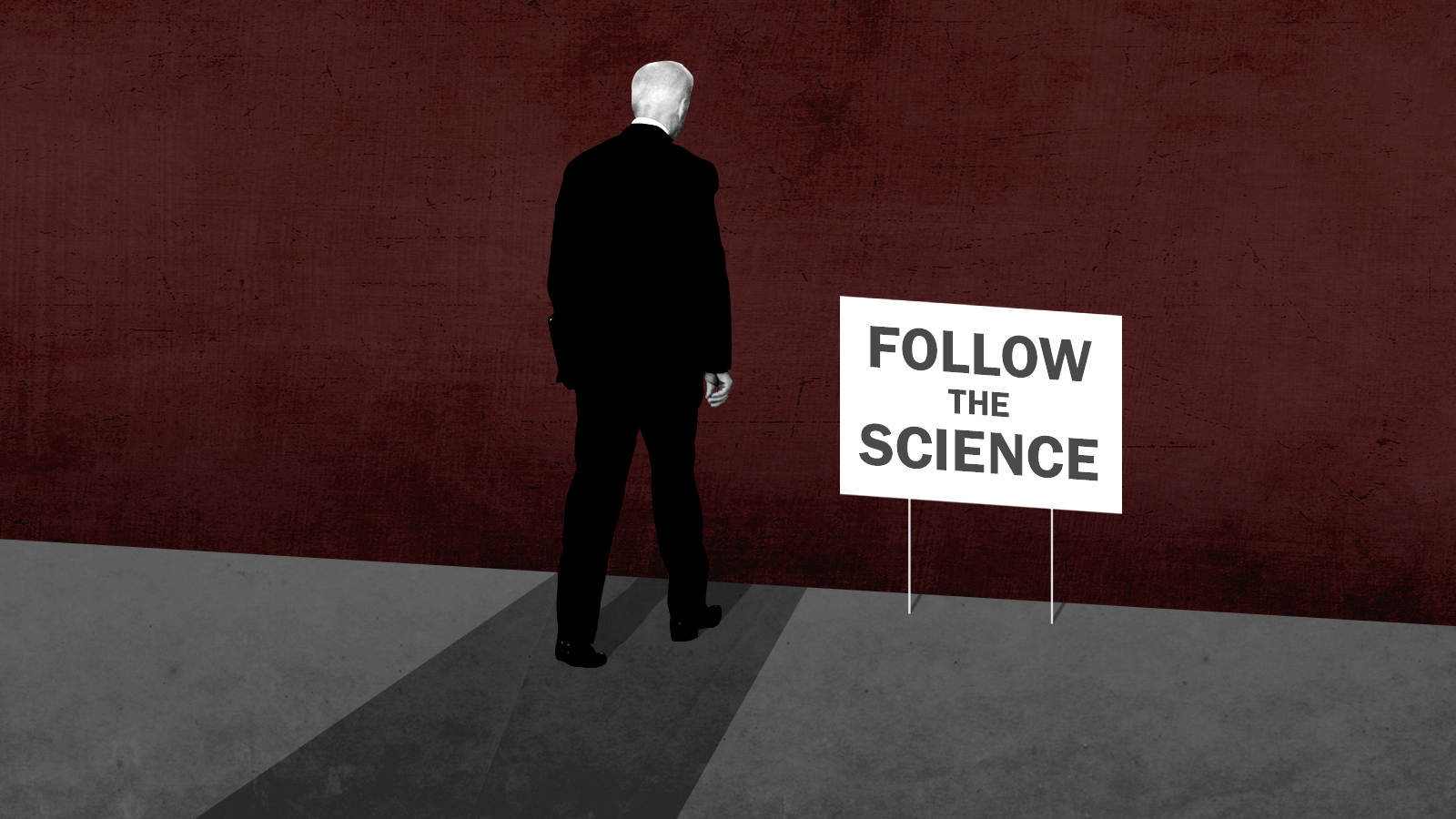Biden finds 'following the science' isn't so easy


A free daily email with the biggest news stories of the day – and the best features from TheWeek.com
You are now subscribed
Your newsletter sign-up was successful
Sometimes, following the science isn't so easy — especially when "the science" is in flux.
That's certainly the case with the Biden administration's plan to roll out COVID-19 booster shots to already-vaccinated individuals. The White House pledged in August to start rolling out the new jabs on a widespread basis starting Sept. 20, but it's increasingly clear that the whole process is more than a bit messy — two FDA vaccine officials resigned last month, reportedly over their opposition to the administration's booster plan, then on Monday joined a larger group of 18 scientists who say there isn't enough data to support a widespread booster campaign.
The implication? President Biden got ahead of the science.
The Week
Escape your echo chamber. Get the facts behind the news, plus analysis from multiple perspectives.

Sign up for The Week's Free Newsletters
From our morning news briefing to a weekly Good News Newsletter, get the best of The Week delivered directly to your inbox.
From our morning news briefing to a weekly Good News Newsletter, get the best of The Week delivered directly to your inbox.
"Although the idea of further reducing the number of COVID-19 cases by enhancing immunity in vaccinated people is appealing, any decision to do so should be evidence-based and consider the benefits and risks for individuals and society," the group wrote in The Lancet medical journal.
As New York magazine reports today, there are a number of moving parts in the debate. On the one hand, there are concerns about waning immunity among vaccinated people; on the other hand, those folks still seem to have pretty good protection against severe illness and death. Israel is already giving boosters, and early data suggests that — for older people at least — the extra shots do improve immunity. Then again, the Lancet authors warn that the side effects from boosters given too soon or too frequently could exacerbate the widespread vaccine hesitancy that has helped the pandemic persist in the United States. Complicating all of this: The World Health Organization has warned against a widespread booster campaign while much of the planet is still waiting for its first shot.
What's a president — especially one who has vowed repeatedly to "follow the science" — to do?
When Donald Trump was in charge, it was easy for Democrats to pledge to follow the science on COVID because Trump so plainly didn't, preferring to focus on his own political well-being. But in an ongoing emergency, when scientists themselves can't agree on a course of action — and when there are ethical questions that don't lend themselves to clear "right or wrong" answers — the slogan's insufficiency reveals itself. Even with the best of intentions, politics will still be a factor: Biden's poll ratings are still slipping, and he needs to be seen doing something.
A free daily email with the biggest news stories of the day – and the best features from TheWeek.com
"Follow the science" sounds easy and simple. In the real world, though, the buck doesn't stop in a laboratory, but in the Oval Office.
Joel Mathis is a writer with 30 years of newspaper and online journalism experience. His work also regularly appears in National Geographic and The Kansas City Star. His awards include best online commentary at the Online News Association and (twice) at the City and Regional Magazine Association.
-
 Health insurance: Premiums soar as ACA subsidies end
Health insurance: Premiums soar as ACA subsidies endFeature 1.4 million people have dropped coverage
-
 Anthropic: AI triggers the ‘SaaSpocalypse’
Anthropic: AI triggers the ‘SaaSpocalypse’Feature A grim reaper for software services?
-
 NIH director Bhattacharya tapped as acting CDC head
NIH director Bhattacharya tapped as acting CDC headSpeed Read Jay Bhattacharya, a critic of the CDC’s Covid-19 response, will now lead the Centers for Disease Control and Prevention
-
 Big-time money squabbles: the conflict over California’s proposed billionaire tax
Big-time money squabbles: the conflict over California’s proposed billionaire taxTalking Points Californians worth more than $1.1 billion would pay a one-time 5% tax
-
 The ‘mad king’: has Trump finally lost it?
The ‘mad king’: has Trump finally lost it?Talking Point Rambling speeches, wind turbine obsession, and an ‘unhinged’ letter to Norway’s prime minister have caused concern whether the rest of his term is ‘sustainable’
-
 Did Alex Pretti’s killing open a GOP rift on guns?
Did Alex Pretti’s killing open a GOP rift on guns?Talking Points Second Amendment groups push back on the White House narrative
-
 Washington grapples with ICE’s growing footprint — and future
Washington grapples with ICE’s growing footprint — and futureTALKING POINTS The deadly provocations of federal officers in Minnesota have put ICE back in the national spotlight
-
 Trump’s Greenland ambitions push NATO to the edge
Trump’s Greenland ambitions push NATO to the edgeTalking Points The military alliance is facing its worst-ever crisis
-
 Why is Trump threatening defense firms?
Why is Trump threatening defense firms?Talking Points CEO pay and stock buybacks will be restricted
-
 The billionaires’ wealth tax: a catastrophe for California?
The billionaires’ wealth tax: a catastrophe for California?Talking Point Peter Thiel and Larry Page preparing to change state residency
-
 Trump considers giving Ukraine a security guarantee
Trump considers giving Ukraine a security guaranteeTalking Points Zelenskyy says it is a requirement for peace. Will Putin go along?
